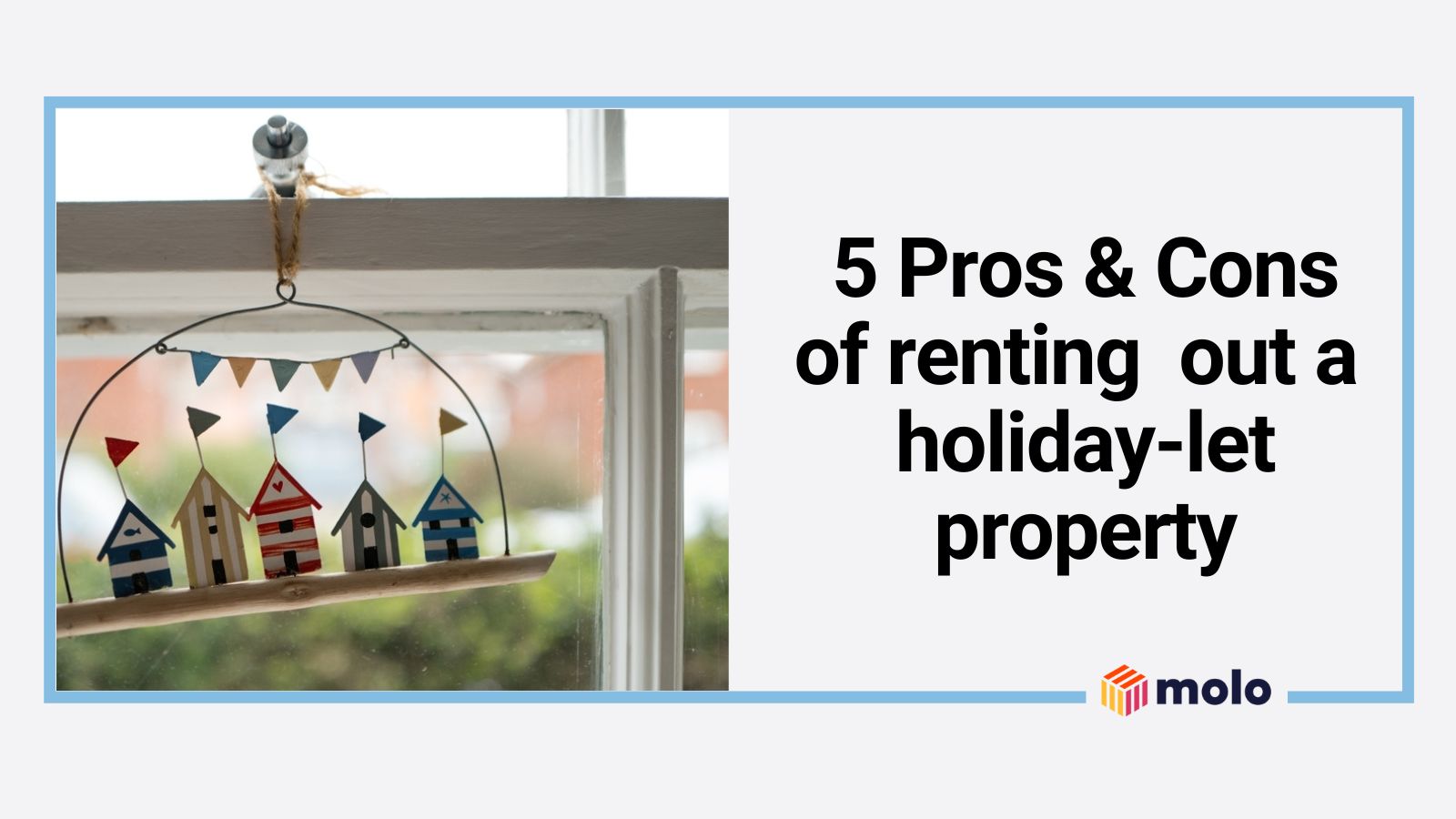The likes of Airbnb have led to an increase in holiday lets. Data from the HMRC shows that the average income declared on a holiday let exceeded that of a long-term let during the previous 2020/21 tax year for the first time ever since records began in 2011.
So are holiday-lets a good idea for property investors? Well, that depends on what you want to achieve from your investment. With that in mind, here are the pros and cons of renting out a holiday-let property in the UK.
Pro: Higher yields
Holiday rentals can be a money-maker, especially in popular spots along the coast or cities such as London. During peak seasons, you could earn significantly more than with a regular rental. The appeal of increased income can be a major pull for some investors, especially ones who own properties in more desirable areas.
Con: Inconsistent income
While holiday rentals can be more profitable during high season, keep in mind that income can fluctuate due to off-peak seasons, even in popular areas. Being flexible during these periods, such as allowing short stays or even just overnight bookings, can help maximise quieter periods. Use the slower times to spruce up the place, so it’s all set for the busy spring and summer months when you’re likely to have guests one after the other.
Pro: Potential tax benefits
Owning a holiday-let may come with some tax perks, as HMRC views it as a business. This is different from a traditional buy-to-let, which is viewed as an investment. If your property qualifies as a Furnished holiday-letting (FHL), you may be able to access additional benefits like various Capital Gains Tax reliefs and allowances for furniture and equipment. For more details on FHL benefits, check out the government’s Self Assessment helpsheet.

80 LTV mortgages
- Borrow up to 80% of the property’s value
- Get a mortgage as an individual or limited company
- An online mortgage application that takes place entirely online.
Con: Increased property prices
Holiday-lets do best in sought-after locations, but these areas typically command a higher premium. For instance, St Ives in Cornwall has an average asking price of £504,108, according to RightMove. To put that into context, the general UK average for a home, according to the latest figures from the Office of National Statistics (ONS) is £286,000. It’s almost double, and you can expect to pay more in high-demand holiday-let areas.
Pro: Access to an international market
Holiday-lets are in high demand in tourist-heavy areas,such as Lake District, London, Edinburgh and Cornwall. By advertising your property on platforms like Airbnb, you can tap into a global pool of potential guests. This could result in your holiday home being occupied for most of the year, providing you with a steady stream of additional income while giving you access to a larger market than traditional buy-to-let rentals.
Con: Insurance
Regular insurance won’t suffice for a holiday-let. You’ll need specialised coverage that covers public liability, loss of rent and accidental damage. If your property is in a high-risk area, like a flood zone, expect higher premium costs. However, with many insurers competing for your business, it’s crucial to shop around to ensure you get the best deal.
Molo has a partnership with Uinsure, who offer specialised insurance for holiday lets.
Pro: A more straightforward process
Thanks to platforms like Airbnb and Vrbo, advertising your holiday-let is fairly straightforward. Unlike a buy-to-let, you probably won’t need a letting agent to advertise the property on your behalf and use agent-only platforms like Rightmove, Zoopla and OnTheMarket. And while it’s important to vet potential guests for reliability, the upfront payment model eliminates the need for extensive credit checks and references, which are also necessary for most long-term rentals.
Con: Increased turnaround
High turnover is one of the reasons why holiday-let owners can charge more, but that same turnover requires more frequent property upkeep compared to a regular rental. Doing this yourself can eat into your time, while hiring an agent for the task will cost you. Although, it’s worth noting that expenses like cleaning are usually tax deductible.
Pro: Flexibility
Owning a holiday-let typically means more flexibility. There may be times throughout the year when you don’t want to rent it out and would rather make use of it yourself. It has a dual benefit: it serves as a getaway spot for you, your family and friends during off-peak seasons, and could even potentially become your retirement home at some stage.

80 LTV mortgages
- Borrow up to 80% of the property’s value
- Get a mortgage as an individual or limited company
- An online mortgage application that takes place entirely online.
Cons: Harder to finance
Securing a mortgage for a holiday-let may come with its own set of challenges, including stringent affordability checks by lenders. Traditionally, it’s not a loan type buy-to-let lenders and other banks have offered routinely.
Pros: You can get a holiday-let mortgage with Molo
Getting a holiday holiday-let mortgage isn’t an issue with Molo. We offer competitive deals for both individuals and limited companies. Apply online for a holiday-let mortgage up to 75% LTV without the hassle of paperwork or appointments, and enjoy faster approval times.
Final thoughts: the pros and cons
Whether or not a holiday-let is the right investment for you, will ultimately come down to your own personal circumstances. With these pros and cons, you can weigh up if it’s the best move or if you’d prefer a traditional buy-to-let. Either way, it’s good to know there are options available for your property investment ambitions.

80 LTV mortgages
- Borrow up to 80% of the property’s value
- Get a mortgage as an individual or limited company
- An online mortgage application that takes place entirely online.


